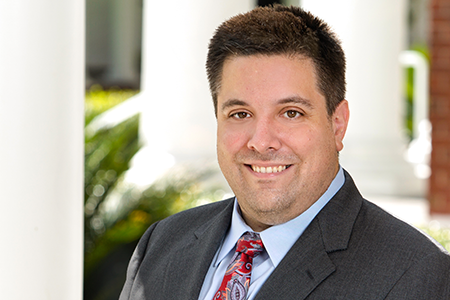Q&A with Professor Michael Morley

What made you decide to become a law professor?
I love the energy and enthusiasm that gifted, dedicated law students bring to classroom discussions. It is exhilarating to have the chance to discuss both timeless and contemporary legal issues with a diverse student body from all walks of life and political persuasions. Being a law professor also allows me to focus on scholarship to attempt to expand the bounds of legal knowledge and potentially influence legal thinking on an even wider scale.
Please explain your area of expertise and why you specialize in that area.
My main areas of teaching and legal scholarship are election law, remedies and federal courts. In particular, my research focuses on the nature, structure and enforcement of the constitutional right to vote, as well as equitable remedies such as injunctions. Election law has always fascinated me because it is not only a theoretically intricate and historically rich field, but has tremendous practical importance. Many of our insights from election law also have ramifications for other fields, such as the legitimacy of independent agencies insulated from political control, or the proper balance of power between elected officials and unelected bureaucrats.
How do you bring your scholarship/research into the classroom?
Particularly during this past election cycle, it was very easy to bring my scholarship into the classroom because important developments were unfolding on a daily basis. During the 2018 election cycle, the State of Florida was in the midst of three statewide recounts, as well as close to a dozen lawsuits. It was a unique and exciting opportunity to expose students to both the procedural and substantive aspects of election litigation and watch new law being made.
Why did you want to join the FSU law faculty?
Florida State is the perfect place to teach election law. Situated in Tallahassee, we are quite literally in the middle of the action when it comes to election litigation, recounts and other disputes relating to voting rights. The faculty is comprised of nationally renowned scholars who are always available to share advice on scholarly works-in-progress and teaching guidance. The students are highly motivated, insightful and devoted to their studies, leading to fascinating classroom discussions. The law school’s Research Center has an extremely dedicated staff of research librarians who are able to help locate even the most obscure sources, and the campus itself is simply beautiful. It was a privilege to have the chance to join such an intellectually vibrant, nationally respected scholarly community.
If you weren’t teaching, what would you be doing?
Before transitioning to legal academia, I worked at the Supreme Court and Appellate Group of a law firm in Washington, D.C.
What do you like to do in your spare time?
I enjoy spending time with my family, reading, watching movies and traveling.
Can you tell us a little about your family?
My wife, Autumn, and I have been married for more than 13 years. We have two wonderful sons: Zachary Blaise, age eight, and Nicholas William, age four.
Is there anything else you’d like alumni to know about you?
One of my most fulfilling professional experiences was working in the Army General Counsel’s Office in the Pentagon, helping oversee the Army’s civilian appellate litigation docket, advising on constitutional and international law issues, and assisting in the preparation of reports to Congress. Having the opportunity to work alongside heroes who had served around the world was both exciting and humbling, and I was particularly inspired by the senior Army leadership’s vigorous dedication to both the rule of law and civilian control of the military.
As printed in the 2019 issue of Florida State Law magazine.

